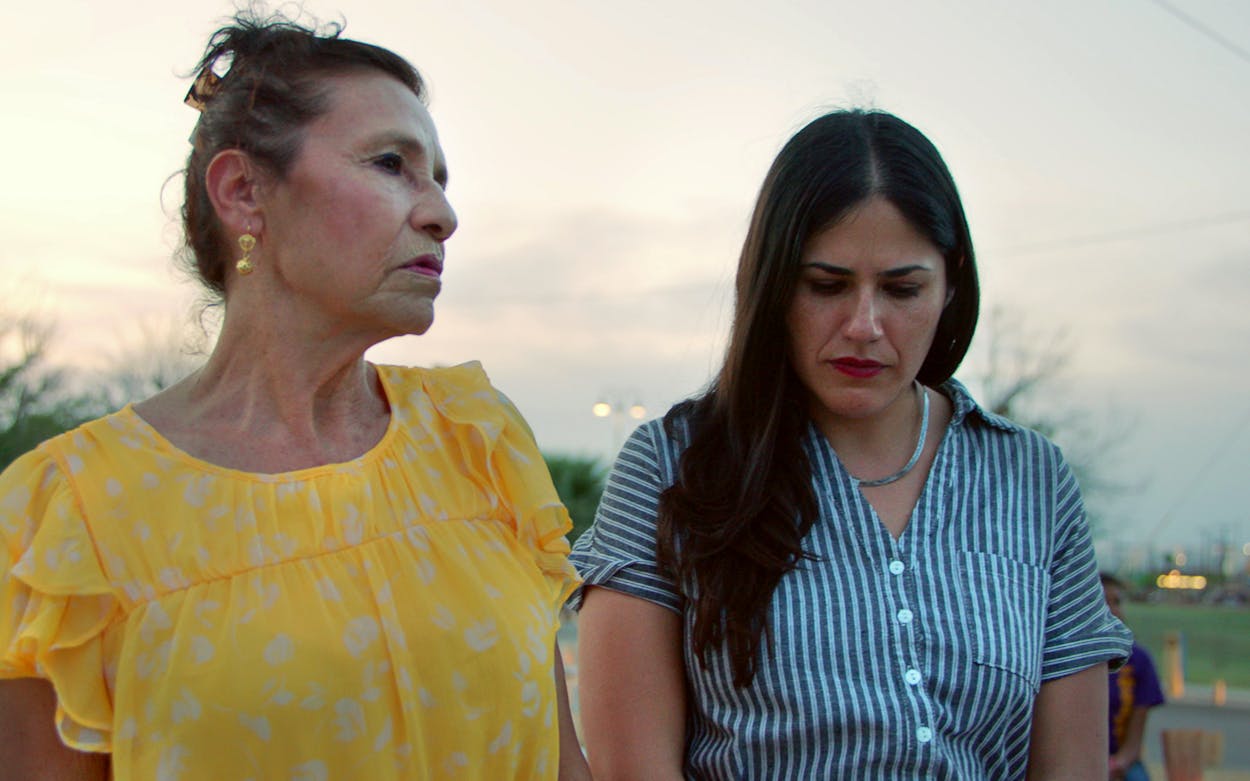“Writers have been sizing up Texas from its earliest days, usually harshly,” writes Pulitizer Prize winner and Texas Monthly alum Lawrence Wright in the opening of his 2018 book, God Save Texas. The same could probably be said of filmmakers, especially where the Texas-Mexico border is concerned. Narcos and migrants, desert and dust—one easily falls into the trap of depicting the starkness of two sides without adequately capturing the nuance of those who live in between.
Inspired by Wright’s book, a new HBO documentary trilogy by the same name introduces viewers to the Lone Star State in its immense complexity by sending three Texan directors back to their hometowns. Richard Linklater presents a portrait of Texas’s criminal justice system in his native Huntsville; Alex Stapleton spotlights the impact of the oil and gas industry on Houston’s Black community. In the third episode of the trilogy, “La Frontera,” Austin-based filmmaker Iliana Sosa returns to El Paso and examines what it means to straddle two lands, a concept she terms in-betweenness, deriving from the Nahuatl word “nepantla.”
As the daughter of immigrants, I’ve long been fascinated by how unique the border is within the broader immigrant experience. While many immigrants pine for a homeland they left thousands of miles behind, the border dweller uniquely lives adjacent to it; often, they’re shuttling between their homeland and their adopted country. In “La Frontera,” Sosa captures this hybridism—with own family as her subject.
All three parts of the documentary, which premiered at Sundance last month, will debut on HBO’s Max on February 27. Texas Monthly spoke with Sosa about her changing relationship with El Paso and the challenges of making a film about the border against the backdrop of our current political moment.
Texas Monthly: The Texas-Mexico border is a site for so much projection. I imagine it was difficult to conceptualize this project—not just because it was personal, but also because there’s so much discourse around the subject. How did you approach telling this story?
Iliana Sosa: We see so many depictions of the border, and I wanted to make sure that we were trying to do something different. Of course, you can’t talk about the border without talking about immigration and talking about the impact that it has had. Beyond that, we talk about what it is to be a hybrid and this complex identity of in-betweenness, because I think that’s something that a lot of migrants and people of the first generation face. That’s what I mean by doing something different—explaining what it’s like to have this complicated identity that’s not just isolated to border crossers, but also people living on the border and having to adapt to this way of life.
TM: One of the things I was struck by in your episode was a conversation you have with your mother in which you ask her whether she views herself as more Mexican or more American—and she answers, “Mexican.” You tell her you feel like the experience of children of immigrants is maybe more complicated. Why do you feel there’s this additional complexity for children who grow up with immigrant parents?
IS: You’re like an interpreter in many ways—culturally, but also in terms of language. That was my experience growing up. There were times when I would have to translate things for my dad or when my mother was studying for her citizenship exam. Children of immigrant parents have to do a lot of navigating. In many ways I feel like I have a split identity. When you go over there to the home country, they know that you’re not really from there—and here also. I remember once having an experience in Argentina and people were like, “You don’t look American. You look like you could be from somewhere else.” It’s having to defy those stereotypes of what it means to be foreign. What does an American look like? It’s complicated because you’re born here, but you’re not quite from here.
TM: Does that feel any different for you in El Paso, since it’s a place where that experience is shared by many others? Do you feel a sense of belonging in El Paso?
IS: I think I do now. Being in Austin is so different from the border. As soon as you land [in El Paso], people are speaking Spanish and it’s a very close-knit community. But I think it took me a while to reconcile with that space and what it is to really live there. El Paso is a beautiful place, but there’s also a lack of opportunities for young people. Growing up, we would call it Hell Paso because there was nothing to do. It’s a love-hate thing, and I feel that in general with Texas right now. I’m trying to adopt the idea that there’s multiple homes you can be part of.
TM: Back to my earlier question about the difference between the experience of immigrants and their children, the first generation—I wonder if part of it, too, is that when you are an immigrant and you’ve left your home country out of necessity, it’s sort of a survival mechanism, you know, to not ask questions. And then as children, we sort of have the privilege of doing that work.
IS: That resonates with me a lot, and I admire that about my mom. It’s really amazing to see. I think that generation went through a lot. In her case, she left home when she was fourteen. Her mother died when she was nineteen. She essentially raised her siblings and has worked all her life. Yet she looks at the world in such a beautiful way, and she’s still surprised by small things and is overall a pretty happy person. My grandfather had a similar character. But things sort of hit me in a different way; I’m a lot more emotional. Maybe it’s that we’re having to process a lot of that. And I think it is healthy to question, and important. That’s how we heal and we move forward. But I do see that resilience in them and I know it’s in me, too, but sometimes it’s hard to tap into it.
TM: How did your family feel about being a part of this documentary?
IS: My mom was in my previous film, so she’s used to it. My father—not so much. This was his first time. But I think they enjoyed it for the most part; they’re very supportive. When I was first starting this career, my dad was not supportive of me being a filmmaker. He wanted me to be okay financially. And now I think they’re very proud.
TM: I didn’t sense any amount of self-consciousness from them. It felt so natural to watch your family.
IS: Yeah! My mom’s like, “I’m only doing this to help you,” but she’s actually really great on camera.
TM: There was a moment during a scene with David Romo, the historian, where he was telling you how they used to spray migrants [who crossed over the border for work] with insecticide, and you became emotional. I was wondering what was going through your head at that moment.
IS: I was thinking about my grandfather. I was thinking about the humiliation that people had to go through and still have to go through—even thinking about the migrants now. It pains me because a lot of the images that we see now, it’s whole families coming through. What I was thinking at that moment is that they’re not able to retain any ounce of human dignity. They’re not seen as human, and it’s just humiliating.
TM: I was curious about your inclusion of Duranguito, the historic El Paso neighborhood that was being threatened by a sports-stadium development. Why did you choose to include this in the film?
IS: When we think about gentrification, we maybe think about bigger cities like Austin or different parts of Texas, but we don’t really think about how that historical erasure is also happening on the border. I wanted to include that just to show that there’s these other layers of erasure happening on the ground.
TM: What is it like to negotiate the border we see in the news versus your experience of having grown up there?
IS: It’s really difficult. It makes you really angry. There’s so much prejudice and racism against migrants, and not even just coming from Republicans or the white community, but even within Latinos themselves. I’ve talked to people on the ground in El Paso who are older-generation Mexican Americans and who don’t want migrants. They’re like, “They’re dirtying the streets.” There’s also the actual issue that the city does not really have the infrastructure. A lot of these cities don’t have the infrastructure. The whole system is beyond broken. And when you don’t know how to handle a situation, you project that fear. You project anger on that person, right? So there’s like an internalized racism. You have Border Patrol agents who are Latino, and sometimes they are the worst against migrants.
TM: That reminds me of a quote by Domingo Martinez that I come back to often: “There is nothing more potentially hostile than the indigenous ego interpreting the laws of his conqueror upon his own people.”
IS: I think with the border stuff and migrants in general, what’s happening points to a larger issue. America is at this very pivotal point of, How do we feel about ourselves? You know, it’s a very typical human response to be angry or to project. And I think that’s the success of Trump. He’s speaking to people who feel like they haven’t been spoken to in a long time who are financially having a difficult time. And so there needs to be someone—a scapegoat—to project that anger and frustration onto. The easiest target is someone like the migrant who doesn’t speak your language, who doesn’t have a way to defend themselves.
TM: You’ve worked mostly on documentaries up to now. Do you have any plans to do something scripted?
IS: I would love to. I started in fiction, but now I’m mostly doing documentaries. It’s been a minute, but I would love to do something—maybe in El Paso, like a dystopian fiction film.
TM: It’s a good landscape for that.
IS: Yeah, absolutely.
- More About:
- Film & TV
- Filmmaker
- Film
- Documentary
- El Paso








